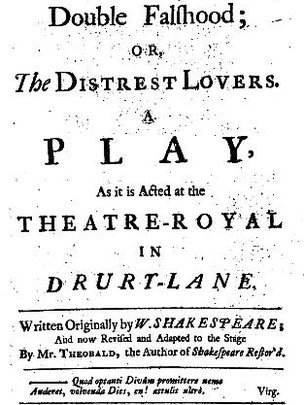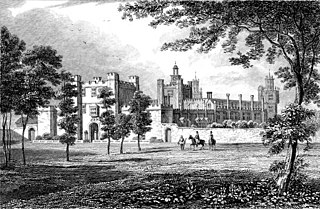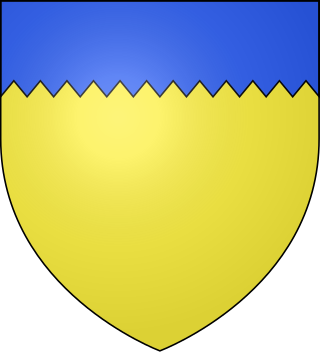James Theobald may refer to:
- James Theobald (politician) (1829–1894)
- James Theobald (natural historian) (1688–1759)
James Theobald may refer to:

Theobald Mathew was an Irish Catholic priest and teetotalist reformer, popularly known as Father Mathew. He was born at Thomastown, near Golden, County Tipperary, on 10 October 1790, to James Mathew and his wife Anne, daughter of George Whyte, of Cappaghwhyte. Of the family of the Earls Landaff, he was a kinsman of the clergyman Arnold Mathew.
Theobald of Bec was a Norman archbishop of Canterbury from 1139 to 1161. His exact birth date is unknown. Some time in the late 11th or early 12th century Theobald became a monk at the Abbey of Bec, rising to the position of abbot in 1137. King Stephen of England chose him to be Archbishop of Canterbury in 1138. Canterbury's claim to primacy over the Welsh ecclesiastics was resolved during Theobald's term of office when Pope Eugene III decided in 1148 in Canterbury's favour. Theobald faced challenges to his authority from a subordinate bishop, Henry of Blois, Bishop of Winchester and King Stephen's younger brother, and his relationship with King Stephen was turbulent. On one occasion Stephen forbade him from attending a papal council, but Theobald defied the king, which resulted in the confiscation of his property and temporary exile. Theobald's relations with his cathedral clergy and the monastic houses in his archdiocese were also difficult.

Theobald Wolfe Tone, posthumously known as Wolfe Tone, was a leading Irish revolutionary figure and one of the founding members in Belfast and Dublin of the United Irishmen, a republican society determined to end British rule, and achieve accountable government, in Ireland. Throughout his political career, Tone was involved in a number of military engagements against the British navy. He was active in drawing Irish Catholics and Protestants together in the United cause, and in soliciting French assistance for a general insurrection. In November 1798, on his second attempt to land in Ireland with French troops and supplies, he was captured by British naval forces. The United Irish risings of the summer had already been crushed. Tone died in advance of his scheduled execution, probably, as modern scholars generally believe, by his own hand.
The History of Cardenio, often referred to as simply Cardenio, is a lost play, known to have been performed by the King's Men, a London theatre company, in 1613. The play is attributed to William Shakespeare and John Fletcher in a Stationers' Register entry of 1653. The content of the play is not known, but it was likely to have been based on an episode in Miguel de Cervantes's Don Quixote involving the character Cardenio, a young man who has been driven mad and lives in the Sierra Morena. Thomas Shelton's translation of the First Part of Don Quixote was published in 1612 and would thus have been available to the presumed authors of the play.
Theobald, Count of Champagne may refer to:

Double Falsehood or The Distrest Lovers is a 1727 play by the English writer and playwright Lewis Theobald, although the authorship has been contested ever since the play was first published, with some scholars considering that it may have been written by John Fletcher and William Shakespeare. Some authors believe that it may be an adaptation of a lost play by Shakespeare and Fletcher known as Cardenio. Theobald himself claimed his version was based on three manuscripts of an unnamed lost play by Shakespeare.
Lewis Theobald, English textual editor and author, was a landmark figure both in the history of Shakespearean editing and in literary satire. He was vital for the establishment of fair texts for Shakespeare, and he was the first avatar of Dulness in Alexander Pope's The Dunciad.
Theobald is a Germanic dithematic name, composed from the elements theod- "people" and bald "bold". The name arrived in England with the Normans.
Blanca of Navarre may refer to:

Theobalds House in the parish of Cheshunt in the English county of Hertfordshire, north of London, was a significant stately home and (later) royal palace of the 16th and early 17th centuries.
Theobald Mathew may refer to:
Events from the year 1790 in Ireland.
Theobald Taaffe, 1st Earl of Carlingford, known as 2nd Viscount Taaffe, of Corren and 2nd Baron of Ballymote between 1642 and 1661, was an Irish Royalist officer who played a prominent part in the Wars of the Three Kingdoms. Following the outbreak of the Irish Rebellion of 1641, the Catholic Taaffe remained loyal to the authorities in Dublin. He later joined the Irish Confederates, and was awarded command of the Munster Army. Taaffe was a supporter of the moderate faction, and strongly supported an alliance between the Confederates and Irish Royalists. After the Cromwellian conquest of Ireland, Taaffe accompanied Charles II in exile. Following the Restoration, he was created 1st Earl of Carlingford.

Frederick Vincent Theobald FES was an English entomologist and "distinguished authority on mosquitoes". During his career, he was responsible for the economic zoology section of the Natural History Museum, London, vice-principal of the South-Eastern Agricultural College at Wye, Kent, Professor of Agricultural Zoology at London University, and advisory entomologist to the Board of Agriculture for the South-Eastern district of England. He wrote a five volume monograph and sixty scientific papers on mosquitoes. He was recognised for his work in entomology, tropical medicine, and sanitation; awards for his work include the Imperial Ottoman Order of Osmanieh, the Mary Kingsley Medal, and the Victoria Medal of Honour, as well as honorary fellowships of learned societies.

Earl of Carrick, in the barony of Iffa and Offa East, County Tipperary, is a title in the Peerage of Ireland.
Saint Theobald may refer to:

Butler is the name of a noble family whose members were, for several centuries, prominent in the administration of the Lordship of Ireland and the Kingdom of Ireland. They rose to their highest prominence as Dukes of Ormonde. The family has produced multiple titles such as Baron Cahir, Baron Dunboyne, Viscount Ikerrin, Viscount Galmoye, Viscount Mountgarret, Viscount Thurles, Earl of Carrick, Earl of Kilkenny, Earl of Ormond, Earl of Ossory, Marquess of Ormonde and Duke of Ormonde. Variant spellings of the name include le Boteler and le Botiller. The Butlers were descendants of Anglo-Norman lords who participated in the Norman invasion of Ireland in the 12th century. The surname has its origins in the hereditary office of "Butler (cup-bearer) of Ireland", originating with Theobald Walter, 1st Chief Butler of Ireland. The arms of later family members depicted three cups in recognition of their original office.
Theobald Butler may refer to:
The Entertainment of the Two Kings of Great Britain and Denmark or The Hours was written by Ben Jonson and performed at Theobalds House on 24 July 1606. John Harington of Kelston described a masque of Solomon and Sheba, performed one day after dinner. There is some doubt over Harington's account. In May 1607 another masque An Entertainment of the King James and Queen Anne at Theobalds was performed when the keys of the house were given to Anne of Denmark.